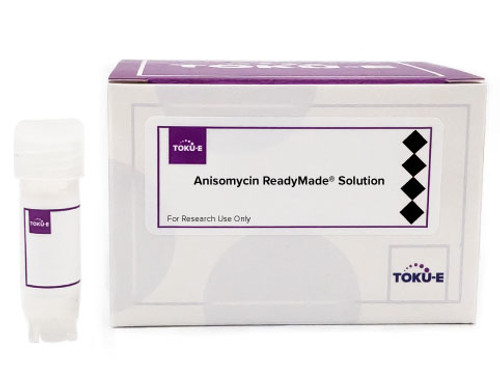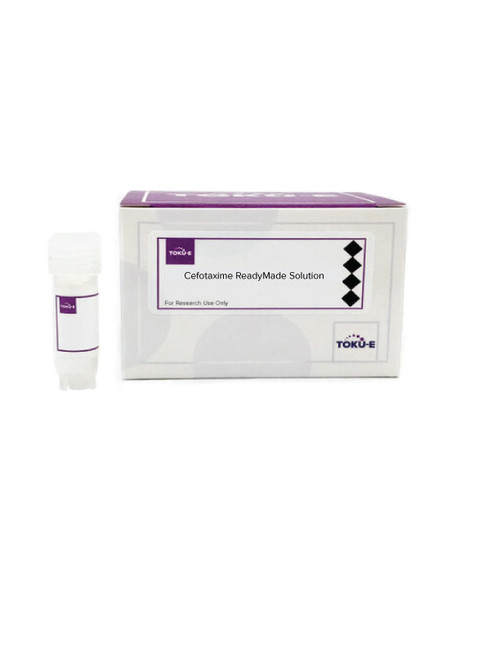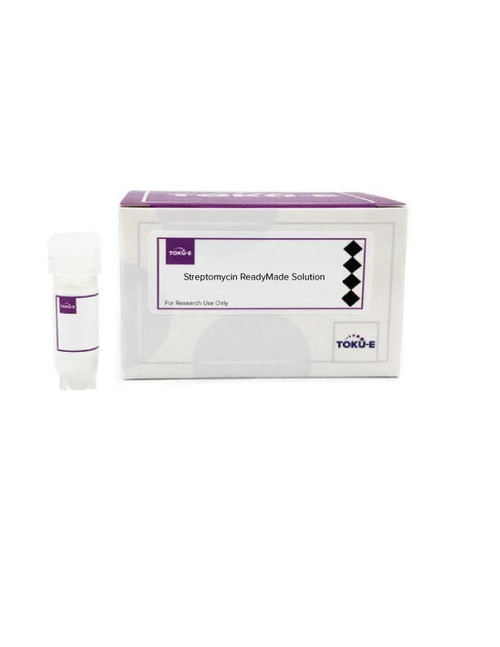Anisomycin ReadyMade™ Solution is a sterile-filtered (0.2 μm) solution of Anisomycin that has been dissolved in PBS (pH 4.6) at a concentration of 10 mg/ml. Anisomycin is a natural alkaloid anti-protozoal pyrrolidine antibiotic that was discovered in 1954. It can activate signal transduction pathways such as stress-activated protein kinases (SAPK) and MAP kinase. SAPK pathways play a role in a number of diseases including cancer and Alzheimer's disease. The product has been used to study apoptosis, affecting both pro- and anti-apoptotic mechanisms. It stimulates two anti-apoptotic proteins, Akt and Bcl-2, and activates JNKs and P38, which both participate in stress and apoptotic responses. Anisomycin may block the SARS-CoV-2 infection, and it can block the macrophage inflammation which may further inhibit the cytokine storm in COVID-19 disease.
We also offer:
- Anisomycin (A021)
| Mechanism of Action | Anisomycin inhibits protein synthesis and depresses the level of the conventional early mRNAS by inhibiting peptidyl transferase or the 80S ribosome system in eukaryotic systems. |
| Spectrum | Anisomycin is active against Gram-negative bacteria and protozoa. It has in vitro activity against dengue and Zika flaviviruses in cell culture. |
| Microbiology Applications | Anisomycin is a component of Martin Lewis agar, used for selective isolation of Neisseria gonorrhoeae and N. meningtidis. Anisomycin (along with polymyxin and cefamandole) is also used in buffered charcoal-yeast extract (BCYE) agar for selective isolation of Brucella species (Raad et al, 1990).
Anisomycin was active against flaviviruses dengue and Zika in cell culture, inhibiting viral protein expression and RNA synthesis. The antiviral effect was not mediated by inhibition of NS5 functions nor activating p38 signaling. The product prevented viral multiplication in human cell lines, impairing a post-entry step of viral replication (Quintana et al, 2020). |
| Eukaryotic Cell Culture Applications | RAW 264.7 cell lines were treated wtih the DNA synthesis inhibitor Anisomycin for 24 hours (20 μM). Authors found that Anisomycin can inhibit the IL2, IL6 and TNFa expression during the LPS induction. Anisomycin may block the SARS-CoV-2 infection and inflammation. It can block the inflammation in macrophages which may further inhibit the cytokine storm in COVID-19 (Gu and Yuan, 2020).
Anisomycin was identified as a candidate compound for COVID-19 based on screening ~3,000 small molecules with a high-quality signature of IFN-β-responsive genes in primary normal human bronchial epithelial cells. It inhibited SARS-CoV-2 replication in Vero E6 cells at nanomolar concentration with half-maximal inhibitory concentration of 31.4 nM (Huang et al, 2020). Authors found that the diluent DMSO had no effect on cell viability at ≤1% (v/v) concentration when used in cell-based screening efforts for SARS-CoV-2 (Zhang et al, 2020). |
| Molecular Formula | C14H19NO4 |
| References |
Gu H and Yuan G (2020) Identification of potential biomarkers and inhibitors for SARS-CoV-2 infection. medRxiv 2020.09.15.20195487 Huang C et al (2020) Enhancement of the IFN-β-induced host signature informs repurposed drugs for COVID-19. Heliyon 6(12):e05646 Quintana VM et al (2020) Antiviral activity of the natural alkaloid Anisomycin against dengue and Zika viruses. Antiviral Res. 176:104749 Raaad I, Rand K, and Gaskins D (1990) Buffered charcoal-yeast extract medium for the isolation of Brucellae. J. Clin. Microbiol. 28(7):1671-1672 PMID 2116452 Sobin BA and Tanner FW (1954) Anisomycin, a new anti-protozoan antibiotic. J. Amer. Chem. Soc. 76(15):4053 DOI: 10.1021/ja01644a076 Yang C et al (2020) Repurposing old drugs as antiviral agents for coronaviruses. Biomed. J. 43(4):368-374 Zhang Z et al (2020) A cell-based large-scale screening of natural compounds for inhibitors of SARS-CoV-2. Sig. Transduct. Target Ther. 5:218 |








